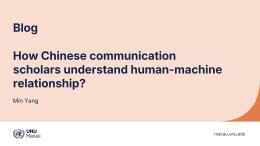On 4 November 2021, a side event of COP26 engaged leading experts to discuss challenges and good practices for achieving carbon neutrality by 2050 and the SDGs. Organised by UNU-IAS and the Overseas Environmental Cooperation Center, Japan (OECC), the event Carbon Neutrality and the SDGs – A UNU Forum was held at the COP26 Japan Pavilion in Glasgow, UK.
Participants explored the social dimensions of the transition to carbon neutrality, which requires drastic action by all sectors and actors, as well as how education and capacity building can advance implementation of the Paris Agreement on climate change.
Discussion also focused on a new UNU-IAS initiative to develop a postgraduate degree specialisation focused on the Paris Agreement. To be delivered from Autumn 2023, it will educate students and experts from across the globe, developing skills and knowledge to play a leading role in implementing the Paris Agreement. It will build on the existing UNU-IAS postgraduate degree programmes established in 2010.
Opening the event, Shinobu Yume Yamaguchi (Director, UNU-IAS) underlined the importance of the 2030 Agenda’s principle of “leaving no one behind” as we pursue the drastic social and economic transformation to carbon neutrality. Emphasising the essential role of education in this transformation, she announced the planned UNU-IAS postgraduate degree specialisation as the first of its kind to be offered by a UN organisation.
Yutaka Shoda (Vice-Minister for Global Environmental Affairs, Ministry of the Environment of Japan; MOEJ) expressed appreciation for the new initiative of UNU-IAS, noting that it would generate synergy with the MOEJ’s commitment to capacity-building for climate mitigation actions.
In a video message, Kazuhiko Takemoto (President, OECC) underlined the importance of taking all necessary actions through an integrated approach to realise a decarbonised and resilient society, minimising the impacts of trade-off.
A framing presentation by Akio Takemoto (Programme Head, UNU-IAS) noted that social justice and equity were core aspects of climate-resilient development pathways for transformational societal change. While actions for carbon neutrality and social agenda can have multiple synergies, drastic actions could generate trade-offs such as energy inequity, which need to be addressed.
The first of two panel discussions, moderated by Dr. Takemoto, focused on possible social co-benefits from climate mitigation actions, and necessary interventions and institutional mechanisms to address energy justice and maximise synergies between carbon neutrality and SDGs. Panellists underlined the importance of local communities in climate mitigation, noting that it could create social co-benefits in economic growth and social development. Local actions bring greater benefits to communities and advance social justice in energy, employment, and health, among other areas. The discussion emphasised that institutional mechanisms such as impact evaluation, targeted actions, and capacity building, were necessary to realise synergies between carbon neutrality and the SDGs.
The second panel discussion, facilitated by Jongwhi Park (Academic Programme Officer, UNU-IAS), considered the role of education for the Paris Agreement and explored further partnerships between the participating organisations. Panellists welcomed the UNU-IAS postgraduate specialisation as a rare and valuable opportunity for students to learn through a practical and multidisciplinary approach. The programme will engage students in practical projects led by practitioners dealing with the Paris Agreement, and create research networks with other partners including universities and research institutes.
In closing the event, Prof. Yamaguchi commended the forward-looking discussion as a valuable contribution to global efforts towards carbon neutrality and a sustainable planet, and looked forward to further collaboration to develop and launch the new UNU-IAS postgraduate specialisation.



